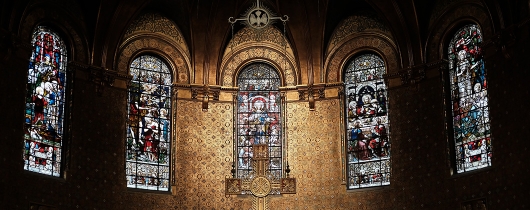The Holy Trinity | La Santa Trinidad

Ss. Nereus & Achilleus, St. Pancras
Acts 17:15, 22-18:1; John 16:12-15
God is one and three, a Holy Trinity. In our gospel reading, Jesus describes their communion: The Spirit will glorify the Son, who has everything with the Father. In our first reading, St. Paul proclaims one God in Athens, a city filled with shrines to many gods.
As we near the end of the Easter season, we draw closer to our celebrations of the Ascension of the Lord, Pentecost, the Most Holy Trinity, and the Body and Blood of Christ (Corpus Christi). In its own way, each of these invites us to reflect on the mystery of God as communion. The divine persons are in communion with each other, and they call us to share in their communion.
It can all seem abstract…until we consider martyrs like Nereus, Achilleus, and Pancras. The first two were Roman soldiers who were executed under the emperor Trajan in the first century. The third was a 14-year-old orphan put to death during the persecutions under Diocletian at the beginning of the fourth century.
These and other martyrs reveal to us the power of communion with God: it draws us out of ourselves and into life with God and one another. Jesus spoke of this when he said that “whoever loses his life for my sake will save it” (Luke 9:24b). Communion involves receiving, but to receive we must also be willing to let go. - jc
-------------------------------------------------------------------------------------------------------------
Ss. Nereo y Aquiles, San Pancracio
Hechos 17:15, 22-18:1; Juan 16:12-15
Dios es uno y tres, una Santa Trinidad. En nuestra lectura del Evangelio, Jesús describe su comunión: El Espíritu glorificará al Hijo, que lo tiene todo con el Padre. En nuestra primera lectura, San Pablo proclama un solo Dios en Atenas, una ciudad llena de santuarios de muchos dioses.
Al acercarnos al final del tiempo de Pascua, nos acercamos a las celebraciones de la Ascensión del Señor, Pentecostés, la Santísima Trinidad y el Cuerpo y la Sangre de Cristo (Corpus Christi). A su manera, cada una de ellas nos invita a reflexionar sobre el misterio de Dios como comunión. Las personas divinas están en comunión entre sí, y nos llaman a participar en su comunión.
Todo esto puede parecer abstracto... hasta que consideramos a mártires como Nereo, Aquiles y Pancracio. Los dos primeros eran soldados romanos que fueron ejecutados bajo el emperador Trajano en el siglo I. El tercero fue un huérfano de 14 años ejecutado durante las persecuciones de Diocleciano a principios del siglo IV.
Estos y otros mártires nos revelan el poder de la comunión con Dios: nos saca de nosotros mismos y nos lleva a la vida con Dios y con los demás. Jesús habló de ello cuando dijo que "quien pierda su vida por mí, la salvará" (Lucas 9,24b). La comunión implica recibir, pero para recibir también debemos estar dispuestos a soltar. - jc




